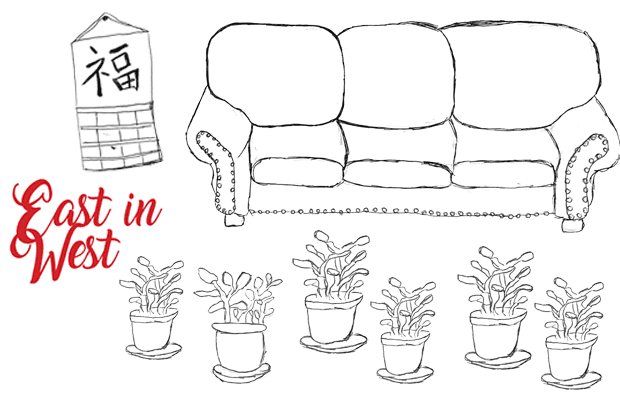I was born to an Australian father, a translator of Asian languages, and a Chinese mother, who eventually trained to become a nurse. Both parents spoke mostly Chinese to me in my early years, so I didn’t speak English until I started going to preschool. I didn’t notice my parents being racially different — at that age I had no concept of it. My home was a blend of Chinese redwood tables and leather couches from Harvey Norman, an oil painting of the Australian outback next to a Chinese calendar with the character for ‘good luck’,’ porcelain dolls and jade plants. I accepted my home as my home, and my parents as my parents.
It wasn’t until I visited family in China that I began to realise the differences between my parents. First night in Shanghai: my mother blended in, speaking easily despite being brought up speaking the Sichuan dialect (she only began to speak in the standard Beijing dialect after meeting my father). My father was treated with great respect at having mastered Mandarin to such a high level in reading, writing, and speaking. They marveled at him and enjoyed when he picked their hometown just from the way they spoke.
But there was not as much need for hospitality and politeness when at a distance. My parents, walking together on Nanjing Road, were regarded in a way that was at once both appalled and intrigued. I was stared at and some people stopped to take photographs of me. “Don’t worry darling. They think you’re pretty,” my mother told me. “They like the ‘mixed’ look here.” And indeed, blown up to gigantic proportions in the department stores were images of Chinese women with Westernised features. The countertops were covered in products that promised to give you double eyelids, a slimmer nose, and lighter hair.
There is a definite exoticism attached to the idea of ‘mixed race’.’ From a 2015 American survey of multiracial adults, 58% of the white-Asian group found that having a racial background of more than one race largely benefitted them and 37% found it made no difference. Out of all the groups, 19% described positive benefits and 4% had felt disadvantaged. Most reported they had experienced discrimination on varying levels, whether being subject to racial slurs or treated unfairly by an employer, again tied to racial perceptions.
Since Samuel Morton’s hierarchy of racial superiority, there has been extensive investigation into the scientific basis of race. In 2000, Craig Venter, a pioneer of DNA sequencing, said at a ceremony at the White House: “The concept of race has no genetic or scientific basis.” Yet race affects us still, because we are continuously perceived according to the race we appear to most ‘belong’ to.
As I increasingly noticed differences in thinking and cultural background between my parents, I began to realise it within myself. The schools I went to were generally divided between white and Asian groups, which I awkwardly straddled. Any academic success was automatically attributed to being part Chinese. Apart from that, I was fetishised because of my mixed heritage: I was ‘other’ enough to be exotic but not too far from whiteness. There are worse things I could recount, but most of my experiences are no better or worse than other mixed-race experiences, let alone any ethnic experience. But it is rarely explored in popular culture.
Many mixed-race people find themselves living between cultures, not fully identifying with any side of their heritage. It’s supposed that we are heading into a post-race era, where most people will be mixed, and the concept of race will eventually disappear. But until then, how we are perceived often has much to do with what race we are, and the external assumptions tied to that race. This can be confusing to developing our own sense of identity, apart from our cultural upbringing.
Perhaps because I observed my father inundate himself with Chinese language and culture, and my mother choose to embrace her newfound Australian identity, my experiences of being mixed were not so clearly defined. There were transatlantic crossings, if you like, within both of my parents. My father had spent several years living in China and a few years after I was born, my mother became an Australian citizen. She adopted the relaxed parenting approach that I noticed in my Western friends’ parents’, while my father maintained the strict attitude to study that my Asian friends’ parents’ had. This meant there was no clear approach, as I saw it, to either side of my heritage. But this is a good thing, not defining, and therefore restricting, any race or culture. Perhaps this means we are able to choose to combine our own familial cultural knowledge and experiences, however disparate, with our current ones.





